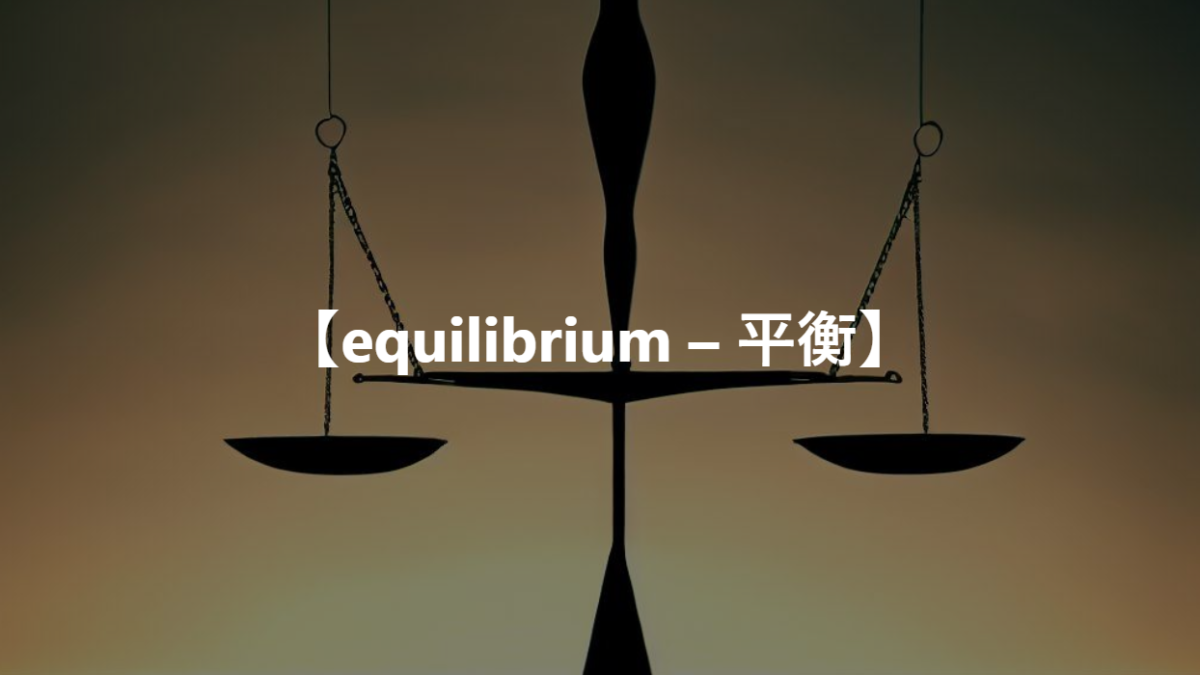語源・類義語・反対語・例文
【Equilibrium – 平衡】という単語の語源とか由来を知っていますか?
「Equilibrium」はラテン語の「aequilibrium」から派生しており、「aequus」(平等な、平らな)と「libra」(天秤、バランス)の二つの言葉から成り立っています。この言葉はもともと、物理的な重量や力のバランスを意味していましたが、時間が経つにつれて、より広い意味で平衡状態や安定した状態を指すようになりました。このため、「equilibrium」は物理学で物体が力の均衡状態にあることを示すために使用されるほか、経済学や心理学など、さまざまな分野で平衡や安定を表すのに用いられます。
The term “equilibrium” derives from the Latin “aequilibrium,” which is a combination of “aequus” (equal, even) and “libra” (balance, scales). Originally, this word meant the balance of physical weight or forces, but over time, it has come to represent a broader sense of balance or stable state. Therefore, “equilibrium” is used in physics to denote the state of balance where a body is subject to equal but opposite forces. Additionally, it is employed in various fields such as economics and psychology to describe a state of balance or stability.
この単語の類義語・反対語を教えてください。
類義語:
- Balance – バランス
- Stability – 安定
- Harmony – 調和
- Steadiness – 安定性
- Equipoise – 均衡
- Evenness – 平坦
- Symmetry – 対称
- Homeostasis – ホメオスタシス(生物の内部環境の安定)
- Poise – 均衡状態
- Stasis – 静止状態
反対語:
- Imbalance – アンバランス
- Instability – 不安定
- Disruption – 混乱
- Asymmetry – 非対称
- Dissonance – 不協和音
- Turbulence – 乱流
- Chaos – 混沌
- Disequilibrium – 不均衡
- Fluctuation – 変動
- Disorder – 無秩序
この単語に似た単語で間違いやすい単語はありますか?
- Equitable – 「Equitable」は「公平な」や「公正な」という意味です。発音と綴りが似ていますが、こちらは物事が平等または公正に行われる状態を指します。
- Equation – 「Equation」は「方程式」という意味です。数学の文脈で使用され、バランスや平衡とは異なりますが、綴りの初めが似ているため混同されやすいです。
- Equator – 「Equator」は「赤道」という意味です。地理的な用語であり、「equilibrium」の物理的な平衡とは無関係ですが、綴りが似ています。
- Equestrian – 「Equestrian」は「乗馬の」という意味です。全く異なる概念ですが、”Equ-“で始まるため、見間違えることがあります。
この単語を使った例文を5つほど教えてください。
The market reached an equilibrium where supply and demand were balanced.
(市場は供給と需要がバランスした平衡状態に達しました。)
It’s important to maintain an equilibrium between work and personal life for overall well-being.
(全体的な幸福のためには、仕事とプライベートの間で平衡を保つことが重要です。)
The body strives to maintain homeostasis, a state of physiological equilibrium.
(体は生理的な平衡状態である恒常性を維持しようとします。)
The therapist helped the patient find emotional equilibrium after a traumatic event.
(セラピストは患者がトラウマ的な出来事の後に感情の平衡を見つけるのを助けました。)
The government implemented policies to achieve economic equilibrium and reduce income disparity.
(政府は経済の平衡を実現し、所得格差を縮小するために政策を実施しました。)
【equilibrium – 平衡】のコロケーション
- Chemical equilibrium – 化学平衡: 化学反応において、反応物と生成物の間で成立する安定した状態を指します。反応が進行しても、それぞれの濃度が変わらない状態を示しています。
- Dynamic equilibrium – 動的平衡: あるシステムが外部からの変化に対応しながらも、全体としての平衡状態を保つことを意味します。物理学や経済学で使用され、変化する環境の中での安定性を示します。
- Market equilibrium – 市場平衡: 経済学において、供給と需要が一致する状態を指します。この状態では、売り手と買い手が満足する価格が設定され、市場が安定しています。
- Thermal equilibrium – 熱平衡: 二つ以上の物体が同じ温度に達し、熱エネルギーの流れがなくなる状態を意味します。これは物理学の概念で、熱力学において重要な役割を果たします。
- Mental equilibrium – 精神的平衡: 個人の精神的な安定や平静さを指します。ストレスや外部からの圧力に対処しながら、内面の平和を保つ状態を示しています。
「Equilibrium」(平衡)という単語は、さまざまな分野で使われる重要な概念です。ここでは、「equilibrium」に関連する一般的なフレーズやコロケーションについて解説します。
まず、「Chemical equilibrium」(化学平衡)は、化学反応が特定の条件下で前進と後退の両方が起こり、最終的に反応物と生成物の比率が変化しなくなる状態を指します。この平衡状態は、化学の世界で重要な役割を果たしています。
次に、「Dynamic equilibrium」(動的平衡)は、システムが外部からの影響を受けながらも、一定の平衡状態を保つことを意味します。この用語は物理学や経済学など、変動する環境を扱う分野で用いられます。
「Market equilibrium」(市場平衡)は、経済学の概念で、市場における供給と需要が一致し、商品やサービスの価格が安定する状態を表します。この平衡点は、市場が効率的に機能している状態を示しています。
「Thermal equilibrium」(熱平衡)は、異なる温度の物体が接触している場合に、最終的に同じ温度になり、熱の流れが止まる状態を指します。これは熱力学における基本的な概念です。
最後に、「Mental equilibrium」(精神的平衡)は、個人が内面の安定や平和を保ちながら、日常生活のストレスや挑戦に対処する能力を指します。これは、心理学や精神健康の分野で特に重要視されています。
これらのコロケーションを通じて、「equilibrium」がどのようにして各分野で平衡、安定、またはバランスの状態を表現するのに用いられているかが理解できます。それぞれの文脈で「equilibrium」は、一定の状態やバランスが保たれていることを示しています。
The term “equilibrium” is a crucial concept used across various fields. Here, we will explain some common phrases and collocations associated with “equilibrium.”
Firstly, “Chemical equilibrium” refers to the state in a chemical reaction where both forward and reverse reactions occur under certain conditions, and eventually, the ratio of reactants to products ceases to change. This state of balance plays a significant role in the world of chemistry.
Next, “Dynamic equilibrium” signifies a condition where a system maintains a constant state of balance despite being subjected to external influences. This term is employed in fields such as physics and economics, where fluctuating environments are studied.
“Market equilibrium” is a concept in economics where supply and demand in the market match, leading to a stable price for goods and services. This point of balance indicates that the market is functioning efficiently.
“Thermal equilibrium” refers to the situation where objects at different temperatures come into contact and eventually reach the same temperature, stopping the flow of heat. This is a fundamental concept in thermodynamics.
Lastly, “Mental equilibrium” points to an individual’s ability to maintain internal stability and peace while dealing with the stresses and challenges of daily life. This is particularly valued in the fields of psychology and mental health.
Through these collocations, we can understand how “equilibrium” is used in various disciplines to express a state of balance, stability, or equilibrium. In each context, “equilibrium” denotes that a consistent state or balance is being maintained.
文法問題: “equilibrium” (平衡)
- 品詞と使い方:
The sudden change in temperature disrupted the delicate _________ of the ecosystem.
(A) equilibriums
(B) equilibriums’
(C) equilibrium’s
(D) equilibrium
解答と解説:
(D) equilibrium 空欄には、冠詞 the の後に名詞が必要です。equilibrium は「平衡」という意味の不可算名詞で、複数形にはなりません。
– - 形容詞形:
The gymnast maintained her _________ on the balance beam with impressive skill.
(A) equilibriums
(B) equilibriums’
(C) equilibrium’s
(D) equilibrial
解答と解説: (D) equilibrial 空欄には名詞 skill を修飾する形容詞が必要です。equilibrial は「平衡の」という意味の形容詞です。
– - 類義語:
The market reached a state of _________ after a period of volatility.
(A) equilibrium
(B) balance
(C) stability
(D) all of the above
解答と解説:
(D) all of the above equilibrium, balance, stability はいずれも「平衡」「安定」という意味で、この文脈ではすべて適切です。
– - 反意語:
The sudden influx of refugees upset the _________ of the small town.
(A) equilibrium
(B) imbalance
(C) instability
(D) all of the above
解答と解説:
(D) all of the above 文脈から、空欄には equilibrium の反意語が入ることがわかります。imbalance, instability は「不均衡」「不安定」という意味なので、適切です。
– - 誤文訂正:
The equilibriums of power in the region shifted after the fall of the dictator.
解答と解説:
equilibriums of power → balance of power equilibrium は不可算名詞なので、複数形の equilibriums は誤りです。また、「力の均衡」という表現は、balance of power が一般的です。

